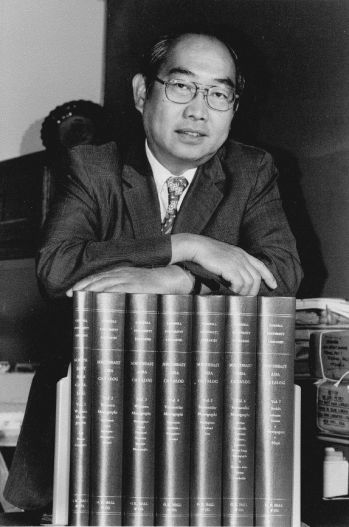Building a Collection: Giok Po Oey and the John M. Echols Collection

by Gregory Green, curator, John M. Echols Collection
As featured in the Spring 2021 SEAP Bulletin, Giok Po Oey (1922-2010) was hired to work at Cornell in 1957 and successfully built a world-class library collection of publications from and about Southeast Asia. His efforts, in collaboration with Cornell faculty, students, and others interested in the region resulted in what is widely recognized as the leading collection of its kind in the world, the John M. Echols Library Collection.
The foundation built during those formative years created a legacy that has lasted far beyond Giok Po’s tenure as Curator when he retired in 1985, and now well beyond the span of his lifetime. During those early years, Giok Po worked closely with the founders of Cornell’s Southeast Asia Program to build up this magnificent treasure known around the world as the John M. Echols Collection on Southeast Asia.
Born on January 16, 1922, in Sukabumi on the island of Java in what was then the Dutch East Indies, Giok Po Oey, of Chinese descent, lived his early years in a period of great upheaval and change. Coming of age at the beginning of World War II, he witnessed the horrific Japanese occupation of Indonesia, an end to centuries of foreign control, and the beginnings of a tumultuous journey toward democracy.
During those difficult early years of his life, Giok Po Oey worked hard as a student, taking a wide variety of courses in high school, including many business and language courses. He did well in his required language courses, taking French, Dutch, English and German, testing “amply sufficient” in the first three, and adding those to his knowledge of Indonesian. Giok Po took the opportunity to formally engage with the Chinese language while he earned the equivalent of a Bachelor’s degree in Chinese language and literature from the Sinological Institute at the University of Indonesia from 1948 to 1951. While in school, he paid for his tuition and living expenses by managing the Institute’s library, beginning his lifetime connection with libraries.
After earning his degree from the Sinological Institute, Giok Po originally applied to come to Cornell for graduate studies in 1951, but chance intervened when he was given funding by the US embassy in Jakarta, Indonesia to attend the University of California at Berkeley for one year of graduate studies. There, he continued his coursework in Chinese language and literature. During the summer after his successful year at Berkeley, Knight Biggerstaff, then Chair of Cornell’s Department of Far Eastern Studies, arranged to fund a position for Giok Po in the Hoover Institute collections at Stanford, where he created a bibliography of every publication in Chinese relating to Southeast Asia. At the completion of that summer, Giok Po finally made his way to Cornell where he had a research assistantship waiting. He initially intended a course of study that would fall short of a Master’s degree. After some time on campus, he changed his mind and ultimately earned a Master’s degree from Cornell in August of 1953.
The rapidly expanding Southeast Asia Program at Cornell, just a few years old when Giok Po completed his Master’s work, had begun building a library collection in earnest. Realizing they would need someone in the library to help arrange and catalog the collection, and hoping to eventually create a curator position for it, they approached Giok Po with an offer to stay in the US and work at Cornell. With the promise of a good job at Cornell University Library, but lacking visa approval to stay, Giok Po returned to Indonesia with a Master’s degree in Chinese Literature focusing on Southeast Asia. He secured a promising position as a reporter at the top Chinese community newspaper in Indonesia while he applied and was denied visa approval multiple times from 1953 to 1955, due to strict limits on Chinese immigration that had been in place in one form or another since the 1880’s. During that time, he married “Tinny” Lian Hoa Tan, whom he had known for some years.
After years of work, Cornell University administration and New York Senator Irving Ives, sponsored special legislation to bring Giok Po to the United States in order to fill a position no others could. With his language training, background in libraries, and knowledge of Southeast Asia, Giok Po was uniquely qualified for the task at hand. Using a $1000 loan from the Southeast Asia Program, Giok Po and his new wife finally moved back to Ithaca and Cornell to begin what would be a life’s work of developing a world-class library collection.